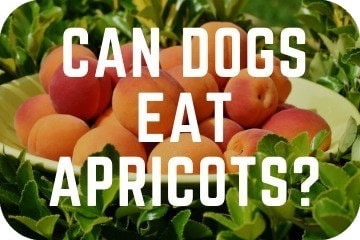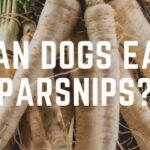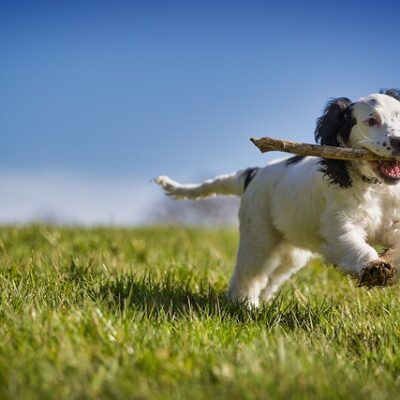Can Dogs Eat Apricots? Yes, well, with precaution and preparation. Apricots themselves are fine for dogs and full of nutrition. However, the seeds and other parts of the apricot plant can be harmful or even fatal for your dog! Apricot plants and their seeds contain traces of something called cyanide. When digested by dogs, cyanide prevents the uptake of oxygen by the red blood cells, making it difficult for your dogs to breathe and ultimately can lead to death.
Busy? Get Your Hands Paws On The Answers Quickly…
As we mentioned above, dogs can eat apricots, but you must take precautions when serving them. Although apricots are slightly high in natural sugars, there are other fruits with a higher sugar percentage.
Fresh apricots and dried apricots are both highly nutritious and contain vitamins A and C. However, the dried apricot has higher levels of antioxidants and potassium, which is beneficial for a dog’s health and well-being.
Below we have outlined the health benefits of the vitamins, minerals, and nutrients of apricots for dogs. There are also some health concerns to consider when feeding your dog apricots, make sure to read them carefully.
Health Benefits
Vitamin A
Apricots help to provide your dog with vitamin A. Vitamin A is vital for your dog as it helps to improve and maintain their optimal health. Vitamin A also helps to keep your dogs skin, coat muscles, and nerves in working order; without this vital vitamin, dogs will become lethargic and seriously ill. Other foods high in vitamin A include; carrots, spinach, pumpkin, and sweet potatoes.
Vitamin C
This vitamin is of high importance. The antioxidants help reduce inflammation inside the dogs’ body as well as helping with cognitive aging. Dogs’ can produce vitamin C in their liver, but that does not mean you should factor it out of their diet as it offers other health benefits. Foods high in vitamin C include; broccoli, sprouts, lychees, and lemons.
Potassium
High levels of potassium can be provided from dry apricots. Potassium is an excellent nutrient for your dogs as it helps to control their nerve impulses, functions the brain, muscle activity, and function of the heart. If your dogs’ potassium levels become too low, it can cause hypokalaemia. Hypokalaemia can affect some dogs a lot, while others won’t show any symptoms. The lack of potassium can affect a dog’s neurological, skeletal, and cardiac muscles, and if left untreated, it could be fatal.
Symptoms of hypokalaemia in dogs:
> Becomes Lethargic
> Constant Vomiting
> Lack of Eating
> Rapid Weight Loss
> Constipation
> Achy and Painful Muscles
> Refuses to Walk or Move
> Increased Thirst and/or Urination
> Tucking Head Into Chest
If your dog is showing signs (see above) of hypokalaemia, you should seek advice from your local veterinarian straight away.
Magnesium
Magnesium is another vital mineral for dogs. Magnesium helps the dog’s body to process as well as functioning the nerve system and muscle mobilization. If you notice a change in your dogs’ muscle strength or tone, this could be down to a lack of magnesium. Foods that have high levels of magnesium include; tofu, whole grains, fish, and nuts.
Antioxidants
A common problem in older dogs is inflammation of the joints, commonly known as arthritis. As dogs get older, the cartilage within the joints can become easily damaged, and this makes their bones, joints, and muscles sore and stiff, ultimately affecting their ability to move or jump.
It is essential more than ever that your dog is getting the nutrients they need. Adding a fresh or dry apricot root to their diet will help to reduce the inflammation around the joints, thus helping to improve their mobility.
Health Concerns
Toxic Seeds!
As we mentioned earlier, the seeds or pip of the apricot is highly toxic for dogs. It contains a toxic called cyanide that reduces the oxygen levels in a dog’s red blood cells. If left untreated, it can cause your dog severe harm or even be fatal!
There have been occasions where owners have been growing apricots in their garden and without realizing that their dog has eaten them once they fell off the tree. If you’re growing apricots, ensure you keeping a close eye day by day to ensure there are no loose apricots on the floor.
Cyanide Symptoms:
> Weakness in the muscles
> Nausea
> Confusion
> Difficulty Breathing
> Dilated Pupils
> Swollen Lips
If you notice this in your dog, you should seek advice from your local veterinarian immediately.
CAN DOGS EAT DRIED APRICOTS?
Yes! As with normal apricots, died apricots should be given to your dog in small quantities and ensure there are no loose pips. As with all new foods/treats, it is a very good idea to seek advice from your veterinarian before doing so.
Dried apricots are high in fiber and are a source of Vitamin B3, potassium, magnesium, phosphorus, iron and copper.
Nutritious Values Per 100g for Dried Apricots:
> Vitamin B3 – 3mg
> Potassium – 1880mg
> Magnesium – 65mg
> Phosphorus – 120mg
> Iron – 4.1mg
> Copper – 0.4mg
WHAT ARE THE DIFFERENT TYPES OF APRICOTS?
There is a wide range of apricots; below, we have described the most popular and suitable for your dog.
Chinese Apricot
The Chinese apricot is the yellow to medium-orange skin color with a fantastic juicy taste full of flavor. It does not require other pollen as it is self-fruitful. The cooling of this type of apricot requires around 700 hours.
Gold Cot
The gold cot apricot tree is approximately 15 feet high. During the beginning of spring, the tree has beautiful looking white or light pink flowers. The apricot fruit is provided by the tree at the start of summertime and tends to be around the beginning of June. The gold cot is orange in color and is a medium to large size. The tree grows very well in various parts of the US, the best being in Minnesota to Austin, Texas.
Tilton
The Tilton apricot is a medium-sized fruit and orange in color. This fruit can be frozen, canned, and dried. Slightly different from other apricot trees, this tree is resistant to the colder months and grows well in cooler climates.
Wenatchee
The Wenatchee apricot, commonly known as the Moorpark is a large-sized apricot that has a light-yellow skin and a delicious taste too! Just like the Chinese apricot, it is a self-pollinating fruit tree and grows best in drained and rich soil.
Gold Kist
The gold kist apricot is the first maturing of its kind. However, it poses highly tricky challenges when attempting to develop them. The gold kist grows best in drained and rich soil. It is a very large size and provides a superior taste. It is a fruit that tastes best when canning, drying, or cooked within a recipe.
As well as apricots, there are a variety of other fruits your dog can eat that provide them with excellent amounts of nutrients, vitamins, and minerals. Below we have provided a description of the most popular and nutritious fruits for your pup. Enjoy!
Watermelon
Watermelon is 92% water, making it a great refreshing and hydrating treat for dogs. It is low in calories, salt, and fat, as well as containing vitamins A, B6, and C, all of which are essential in a dog’s diet.
Vitamin A
A vitamin A rich diet will help keep your dog’s coat shiny, muscles strong, and good night vision. Other foods rich in vitamin A include cod liver oil, beef liver, sweet potato, and carrots.
Vitamin B6
This vitamin aids with controlling hormones specifically for thyroid-related issues. Sufficient B6 helps with heart health, weight regulation, and water regulation. Other foods with high B6 levels include eggs, fish, turkey, chicken, and wholegrain rice.
Vitamin C
Several studies have shown that dogs with a sufficient level of vitamin C are better at fighting disease and illnesses. Stress and exhaustion can cause a depletion in vitamin C. Other foods rich in vitamin C include broccoli, spinach, potatoes, and Brussels sprouts.
Calories
This fruit is low in calories and a great refreshing snack for dogs. Watermelon has around 50 calories per cup. Dogs should not consume more than 10% of their calorie intake in treats. So if your dog’s daily calorie intake should be 250 calories, they can safely have 1/2 cup of watermelon as a healthy treat.
Sugar
Watermelon does have high sugar content, and although this is natural sugar (fructose), it is still recommended to eat in moderation.
If your dog does have diabetes or any other condition which could be affected by their sugar intake, make sure to consult a vet before feeding. Alternative low sugar treats, such as vegetables, could be a great alternative.
Fiber
Fiber isn’t a necessity in a dog’s diet and isn’t something ‘wild’ dogs would have eaten. However, it can help with the gut, digestive system, and to keep consistent bowel movements.
Blueberries
Blueberries are an excellent choice of snack for your dog. They are super low in calories yet have high amounts of vitamin C & K, fiber, and antioxidants. Vitamin C and fiber are important components of a canine’s diet, as well as the antioxidants that help fight off diseases, illnesses and decrease the risk of arthritis in older dogs.
Blueberries also make an excellent choice of snack due to their size—no need for slicing and dicing, straight out of the packet into your dog’s bowl. Ensure you don’t leave the blueberries alone with your pup; otherwise, there’ll be some mighty clean up operation to come!
Bananas
Bananas are high in potassium, vitamin B6, and vitamin C. Some highly qualified veterinarians recommend this fruit as a natural replacement for shop-bought treats that can be high in fat and calories. However, like with all ‘human’ foods, it should be given to your dog in moderation and ensure they’re not allergic to it.
Bananas are best peeled and sliced for your furry friend; however, if they do eat the skin, you do not need to worry as it is not toxic. Finely slicing the banana into small chunks will help avoid any potential choking hazards.
If you have any mentally stimulating dog toys, for example, a kong, you can mush the banana up and put it inside the kong, this works great and keeps your dog occupied for an extended period of time.
Can Dogs Eat Broccoli?
Yes. Dogs can eat cooked broccoli, but raw broccoli isn’t recommended. However, owners must remember to limit portion sizes as too much broccoli can cause stomach problems. Broccoli is full of fiber and vitamin C. Therefore, it has high levels of nutrients and the perfect snack for your dogs.
Is Peanut Butter Good For Dogs?
In short, yes, they can. However, some peanut butter contains xylitol, which is toxic to dogs. Therefore when purchasing peanut butter for your dog, you should check the labels and ensure your product is xylitol free. Peanut butter works as a great treat and can also go inside a kong, which is a fun, enjoyable, and stimulating game.
Can Dogs Eat Quinoa?
Yes. Cooked quinoa can be a great addition to your dog’s diet. It has many nutritional benefits, including being high in fiber and protein, low in fat, and full of vitamins and antioxidants.
Can Dogs Eat Pretzels?
In short, unfortunately, not! Dogs cannot eat pretzels due to the high levels of sodium and salt. Snacks like pretzels are always proven popular as a guilt-edge snack for us humans, but of course, like with any other types of snacks or food, our dogs will be interested in it too. Unfortunately, pretzels cannot be a shared snack between humans and dogs due to the high levels of salt and sodium. Read more to find out why salt and sodium is bad for dogs as well as other snack alternatives we can share with our dogs.
SaveWild Barkers2Wild BarkersCan Dogs Eat
Looking for more pawsome posts? Check these out…
Can Dogs Eat Pretzels?
How To Make A Snuffle Mat
Can Dogs Eat Parsnips?
Vegetable String Game For Dogs
Can Dogs Eat Watermelon?
Disclaimer: Each dog is different, and every circumstance is different. All efforts have been made to provide accurate information. However, it is not provided by a qualified Veterinarian, Veterinarian Surgeon, or Behaviorist. The information provided is purely educational. The information should not be used as an alternative or substitute for medical care. If you have any health or medical concerns, contact a qualified Veterinary Surgeon or Veterinarian immediately.











No Comment! Be the first one.